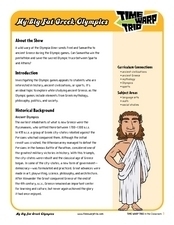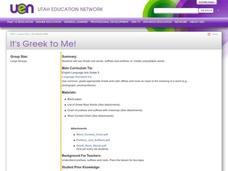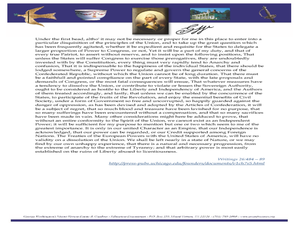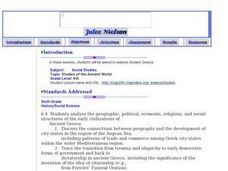Time Warp Trio
My Big Fat Greek Olympics
The Olympic Games are indeed a significant and far-reaching cultural component in our international community today, but from where do they originate? Where do our traditions stem from, and how do we choose the sports that constitute...
National Endowment for the Humanities
The Greek Alphabet: More Familiar Than You Think!
In this Greek alphabet lesson plan, pupils explore the Phoenician origins to the Greek alphabet. Learners compare Greek letters to current letters and write a paragraph about the life of students in ancient Greece. They also identify...
Curated OER
Compare the United States Government with Other Political Systems
Young scholars explore the U.S. form of government and illustrate other forms of government found throughout the world. They explain the similarities and differences between the U.S and other governments.
Curated OER
It's Greek to Me!
Use Greek roots, suffixes, and prefixes to create polysyllabic words. Readers use the dictionary to identify what the word's prefix, suffix, and root or base word mean. They define what a syllable is and how one is formed using Greek...
Curated OER
Democracy: An Introduction.
Students study the U.S. Constitutional System and how it compares with forms of democracy that developed in ancient Greece and Rome. They list and explain the requirements it takes to form a society to be considered a nation.
Curated OER
Going Greek
Third graders learn about the life of a young boy in Greece and all about his cultural heritage. Pupils gather information about the history, culture, and the many influences the ancient Greeks had on modern day society. Terrific video...
Curated OER
Comparing Sparta and Athens
Students are taught the differences between totalitarianism and democracy. They discuss the historical roots of the democratic tradition. Students are introduced to the term totalitarianism and are told that it is a form of government...
Museum of Tolerance
The Role of Citizens in a Participatory Democracy
Groups research participatory democracies and compare the role and rights of citizens in ancient history with those in recent U.S. history. Guided by a series of questions, individuals compose a persuasive essay in which they discuss the...
Curated OER
George Washington & the Classics
Students will compare and contrast famous philosophers with George Washington. In this history lesson, students work in small groups to define Classicism, Legalism, Democracy, Republic and Civility, then read some short excerpts so that...
Curated OER
Parthenon
Ninth graders explore he purposes of the Parthenon. In this World History instructional activity, 9th graders create a complete picture of the Parthenon. Students research one aspect of the structure and report their findings back to...
Curated OER
Studies of the Ancient World
Sixth graders, after taking a pretest, write a paragraph describing the difference between Athens and Sparta and write an article about the ancient Phoenicians, describing their contributions to world history. They compare democracy in...
Curated OER
Justinian I
Students research emperor Justinian I in this lesson. They identify the contributions of Theodora to Justinian's rule, and the expansion of the Byzantine Empire during this time. They then analyze the contributions of Byzantine on...
Curated OER
Animal Tales Around the World
Students explore characteristics of Indian Tales/ Parables. In this literature lesson, students compare contemporary society to western culture through analysis. Students create their own tales using this genre.














